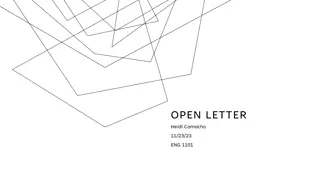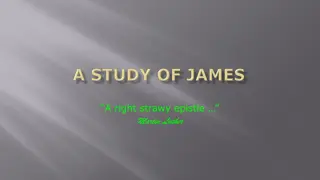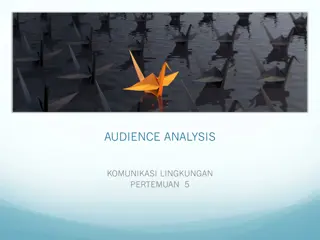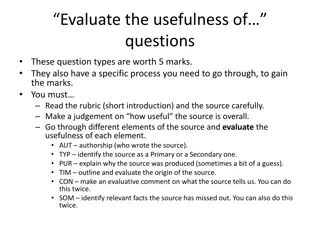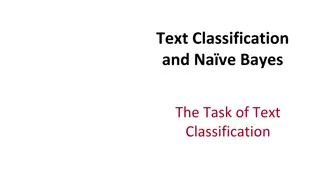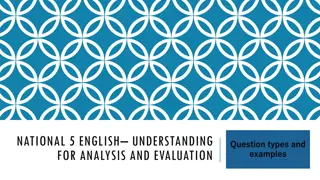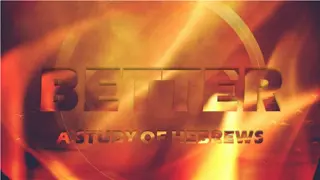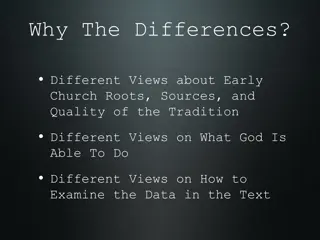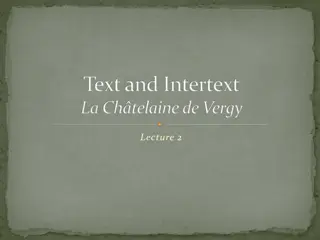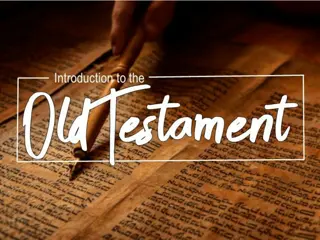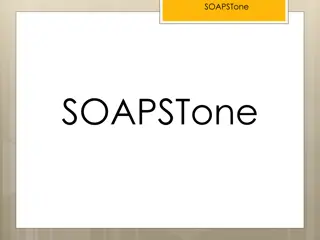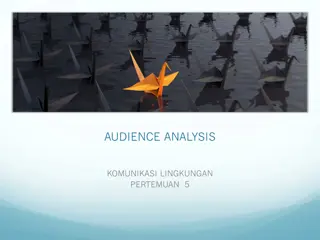Analyzing Authorship and Audience in Written Pieces
Uncover the intricacies of speaker identification, discern the occasion, audience, purpose, and subject of literary works. Understand the voices behind the narratives and the motivations driving the writing. Dive into the contextual and immediate factors shaping the creation of texts. Explore the intended recipients of these messages and the underlying messages authors aim to convey.
Download Presentation

Please find below an Image/Link to download the presentation.
The content on the website is provided AS IS for your information and personal use only. It may not be sold, licensed, or shared on other websites without obtaining consent from the author. Download presentation by click this link. If you encounter any issues during the download, it is possible that the publisher has removed the file from their server.
E N D
Presentation Transcript
HOPE EVERYBODY IS HAVING A FANTASTIC DAY!!! AND YES, I AM ALWAYS HAPPY!!!!
SOAPS-Tone Speaker Occasion It is a series of questions that you must ask and answer as you read material and plan any written responses Audience Purpose Subject Tone
Who is the Speaker Before you begin to read, you must decide whose voice is being heard (who is telling the story?). Does the voice belongs to a fictional character or to the actual writer? You must determine how to discern those attributes of the speaker that will influence the perceived meaning of the piece. Your goal in this section is to determine the speaker and all that you know about him/her. It is not enough to simply name the speaker you must understand the speaker based on references either in the text or through historical research.
What is the Occasion? o The time and the place of the piece; the context that prompted the writing. All writers are influenced by the larger occasion: an environment of ideas, attitudes, and emotions that swirl around a broad issue. Examples; Civil War Historical Timeframe New Yorker during 9/11 Immediate Occasion o Your goal in this section is to determine what prompted the writer to create this work. Try to address both the larger and the immediate occasions.
Who is the Audience? The group of readers to whom this piece is directed. As you begin to read, you must determine whom the audience is that the author intends to reach. It may be one person or a specific group. This choice of audience will affect how and why you read a particular text. Your goal in this section is to identify the audience by describing some of its characteristics described either in the text or through historical research.
What is the Purpose? The reason behind the text. You need to consider the purpose of the text in order to develop the thesis or the argument and its logic. You should ask yourself, "What did the author want his/her audience to think as they read his/her writing? o Your goal in this section is to determine the author s purpose for writing: is it to persuade, entertain, attack, condemn, support, etc.?
What is the Subject You should be able to state the subject in a few words or phrases. This step helps you to focus on the intended reading or writing throughout the process. Your goal in this section is to determine the subject of the text. From that subject, you should also try to identify additional themes of the text where do you see evidence of these themes within the text, and what impact do these have on the meaning of the text as a whole?
What is the Tone? The attitude of the author. The spoken word can convey the speaker's attitude and thus help to impart meaning through tone of voice. With the written word, it is tone that extends meaning beyond the literal, and you must learn to discern this tone in the diction (choice of words), syntax (sentence construction), and imagery (metaphors, similes, and other types of figurative language). Your goal in this section is to find words or phrases that describe the tone of the piece as a whole.
How do you feel? Lets practice one together!
Cool? Lets write these in your notes and breakdown a document together using SOAPS-Tone.
Xenophon, Xenophon, Greek c c. . 370 370 BCE BCE Greek general general and and diplomat, diplomat, On On Men Men and and Women Women from from Oikonomikos Oikonomikos, , "God "God from to to the the outdoor outdoor tasks capable capable of of enduring imposed imposed on on him less less capable capable of And And knowing knowing that nourishment nourishment of new new- -born born babes babes than protection protection of of the no no disadvantage, disadvantage, God man man; ; and and knowing knowing that defender defender against against any courage courage. . Thus Thus your whose whose work work is is outside, watch watch over over so so much for for a a year year be be not see see that that cloaks cloaks are corn corn is is in in good good condition from the the first first adapted tasks and enduring cold him the the outdoor of such such endurance, endurance, I I take that he he had had created of the the infants, infants, he than to to the the stores stores also, also, knowing God meted meted out that he he who any wrong wrong- -doer, your duty duty will outside, and much as as is is to not spent spent in in a a month are made made for condition for adapted the and cares cold and outdoor tasks the woman's woman's nature, cares. . For For he and heat, heat, and and journeys tasks. . To To the take it it that created in in the he meted meted out the man man. . And And since knowing that out a a larger larger share who deals deals with with the doer, he he meted will be be to to remain remain indoors and superintend superintend those to be be kept kept in in store, month. . And And when for those those that that want for making making food food. . nature, I I think, he made made the journeys and the woman, woman, since that God God has the woman woman and out to to her her a a larger since he that for for protection protection a a fearful share of of fear fear to the outdoor outdoor tasks meted out out to to him indoors and and send those who who are store, and and take take care when wool wool is is brought want them them. . You You must think, to the man s man s body and campaigns campaigns; ; and since he he has has assigned assigned the and had had imposed larger portion portion of he imposed imposed on and man's man's mind more and therefore therefore has made made her the indoor indoor tasks imposed on on her of affection affection for on the the woman woman the fearful disposition disposition is is to the the woman woman than tasks will will have have to him again again a a larger larger share send out out those those servants are to to work work indoors, care that that the the sum brought to to you, you, you must see see too too that to the the indoor indoor and body and and mind more her body body tasks. . her the the for the than to to be be their share of servants indoors, and sum laid laid by you must that the the dry to the the their of and by must dry
Xenophon, Xenophon, Greek c c. . 370 370 BCE BCE Greek general general and and diplomat diplomat, , On On Men Men and and Women Women from from Oikonomikos Oikonomikos, , "God "God from to to the the outdoor outdoor tasks capable capable of of enduring imposed imposed on on him less less capable capable of And And knowing knowing that nourishment nourishment of new new- -born born babes babes than protection protection of of the no no disadvantage, disadvantage, God man man; ; and and knowing knowing that defender defender against against any courage courage. . Thus Thus your whose whose work work is is outside, watch watch over over so so much for for a a year year be be not see see that that cloaks cloaks are corn corn is is in in good good condition from the the first first adapted tasks and enduring cold him the the outdoor of such such endurance, endurance, I I take that he he had had created of the the infants, infants, he than to to the the stores stores also, also, knowing God meted meted out that he he who any wrong wrong- -doer, your duty duty will outside, and much as as is is to not spent spent in in a a month are made made for condition for adapted the and cares cold and outdoor tasks the woman's woman's nature, cares. . For For he and heat, heat, and and journeys tasks. . To To the take it it that created in in the he meted meted out the man man. . And And since knowing that out a a larger larger share who deals deals with with the doer, he he meted will be be to to remain remain indoors and superintend superintend those to be be kept kept in in store, month. . And And when for those those that that want for making making food food. . nature, I I think, he made made the journeys and the woman, woman, since that God God has the woman woman and out to to her her a a larger since he that for for protection protection a a fearful share of of fear fear to the outdoor outdoor tasks meted out out to to him indoors and and send those who who are store, and and take take care when wool wool is is brought want them them. . You You must think, to the man s man s body and campaigns campaigns; ; and since he he has has assigned assigned the and had had imposed larger portion portion of he imposed imposed on and man's man's mind more and therefore therefore has made made her the indoor indoor tasks imposed on on her of affection affection for on the the woman woman the fearful disposition disposition is is to the the woman woman than tasks will will have have to him again again a a larger larger share send out out those those servants are to to work work indoors, care that that the the sum brought to to you, you, you must see see too too that to the the indoor indoor and body and and mind more her body body tasks. . her the the for the than to to be be their share of servants indoors, and sum laid laid by you must that the the dry to the the their of and by must dry
Xenophon Xenophon was a Greek historian, soldier, diplomat and a scholar of Socrates Many of his books were Socratic written, where Xenophon portrays his writing as if Socrates is speaking himself.
Historical Timeframe / Immediate Occasion The evolution of gender roles and expectations. Political power become major part of everyday life. Men rise to power, creating a social structure to follow and respect. Men were to be in charge, while women stood behind them and supported them and the city. Influential writers like Socrates, Plato, and Aristotle. Democracy = land owning men, demining women roles further.
Lets Practice Another One! Get with a partner(s) Everybody needs to have a piece of paper Work together to break down the document using SOAPST-one When finished, turn your paper in. Remember that everybody needs to turn in a paper.






 undefined
undefined






